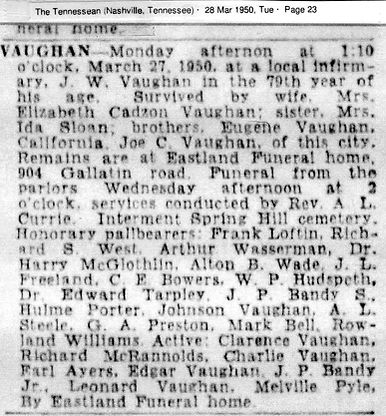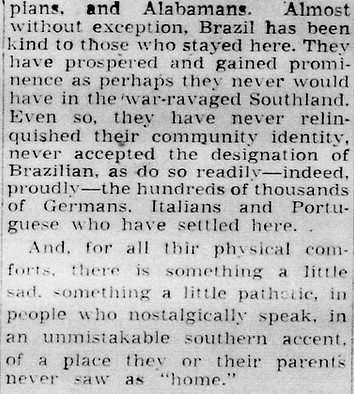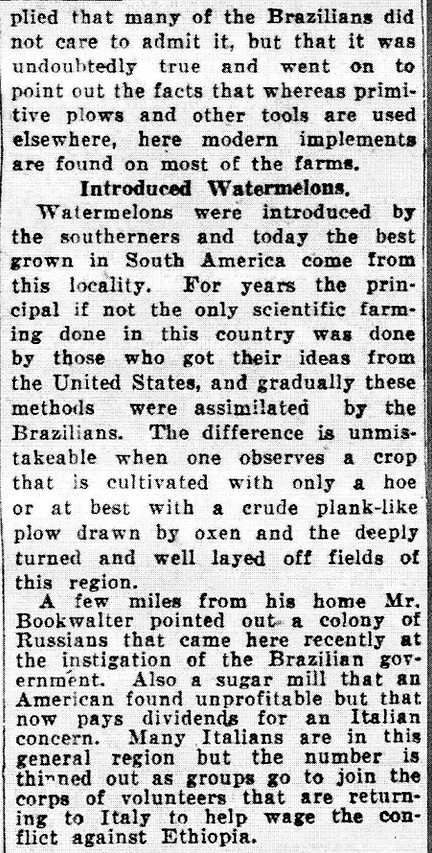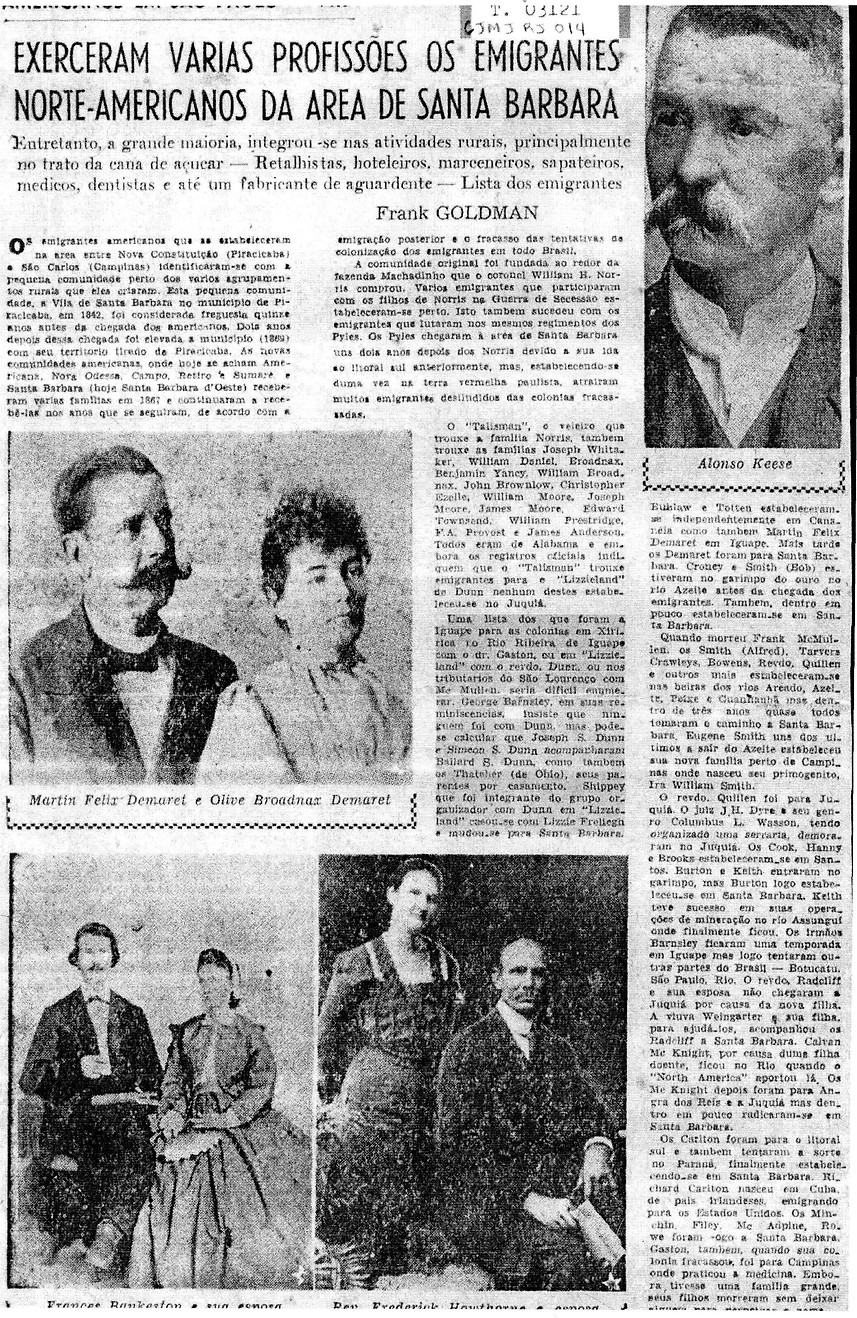Various Newspaper Articles






















AN AMERICAN COLONY IN BRAZIL
What Newspaper published this? When? Was the Brazilian Reflector and English Language paper in Rio or somewhere in the U.S?
Letter from the Southerner to the Brazilian Paper - Personally Interesting to the Home Friends of the Colonials.
The following letter we take from the Brazilian Reflector, a journal published at Rio Janeiro in the interests of the Confederate Colonists. It could be found exceedingly interesting.
SANTAREM, ON THE AMAZON, August, 1868
To the Editor of the Brazilian Reflector:
Dear Sir – I take the liberty of writing to you, on the ground that your paper is benevolently inclined, and I believed it to be an act of charity to help us poor Southerners in giving publications to our appeals to brother exiles. I supposed, too, that you would like yourself to know something of us, so far away on the banks of Amazon, outside, almost of the pale of civilization, buried in the deep recesses of the Amazonian wilds. Our means of communication with Rio de Janeiro, and other parts of Brazil south of Rio are so devious and uncertain that we seldom endeavor to give our scattered countrymen in the south any news of ourselves.
Reports, too, from your part of Brazil to ours are so very unfavorable; that we fear almost, that you would consider us as exulting and triumphant should we inform you of our success. True, this success has not been very great, still, to most of us, it must been sufficient, and we are satisfied. We had succeeded in an humble way, and have barely supported ourselves as yet we have not had time to do more. We have all done the work ourselves - none of us had the money to hire workmen.
As the matter of course, men who were never accustomed to hard bodily labor could not be expected to open large plantations in a new months, but as much as could have been rationally expected as been done. Some are now being as well as they lived in the United States before the War. Dr. Pitts, a Tennessean, for example, leaps a first-rate table, and buys nothing but carne secca.
Only last Sunday I visited him. I found him well, and in high spirits, but his wife was not perfectly satisfied. She told me, what I think explains her slight dissatisfaction, that it had been seven weeks since she had seen an American lady’s face. The doctor had planted sweet potatoes, several varieties of beans, and peas, pumpkins, green corn, cucumber, (illegible), and a kind of squash that was very delicious.
He had also plenty of tomatoes and water melons.
The doctor’s garden is not an exception; others have better. Mr. Rhome, at the place called “Taperinha,” can add to the doctor’s behalf far by giving real hot “syrup de batons” just taken from the kettle, and good battered (illegible – probably chicken), butter and milk, and all the different ripened fruits for dessert.
Messrs. Vaughn, [original spelling] Riker, and Weatherly are doing well, have good crops growing, and are very hopeful. Mr. Vaughn has a great deal of tobacco growing, and is very busy just now in putting it up in salable shape.
Notwithstanding the stampede made by the large portion of Major Hasting’s colonies, we are welcoming, by almost every steamer, every new addition to our colony. But a shot had been, the Rev. R. T Hennington and family, Mr. B. Spurlock and family, Dr. S. F. Stroope and family arrived here, accompanied by Messrs. P. Norman and John P. Massey.
Mr. Hennington is from Mississippi; Mr. Spurlock is lately from Texas, Dr. Stroope of Arkansas, and the two young men from Mississippi.
Mr. Hennington has bought out Mr. xxxx, (ILLEGIBLE) an old settler, and is now living at his place. Dr. Stroope, too, has already settled within the colonial limits.
Judge J. B. Mendenhall from Alabama, with his family, are close neighbors to Mr. Hennington [original spelling] and are well satisfied. The Judge has great faith in his tobacco crop, and I think has reason for it. His little son George brought a cartload of vegetables to town some how days ago and sold them to the steamers.
Mr. E. S. Wallace came to town last Saturday with a large canoe load of corn for all, and made arrangements for selling some 2000 hands of corn he had still remaining from his first crop. He sold it, I believe, for one Real, or sixteen cents a hand of fifty ears. And American cotton grows well here, but none of us have the means to operate extensively in that article. If some capitalist were to come here he could make money raising cotton. Tobacco paid luxuriantly, and large proceeds will be realized from it even in this year.
General Dobbins, Col. Menefee, Dr. Jones and family, Dr. Carter and family, and Col. Charles M. Broome, are all settled up on the Tapajos, two or three days trip from Santarem. Dr. Carter told me he had a stock of American cotton with 250 bolls on it. Cotton (American) does not grow here any taller than in the States, but grows much more luxuriantly. They are comfortable settled and, I believe, determined to stay. Mr. P. O. Chaffier has, they say, 16,000 tobacco plants, which he himself tends, and which bid fair to yield him good returns.
My father, Captain S. L. McGee, bought an Eugenio de assucar (sugar mill) near the city of Para. I visited him but shortly since and found him busy in distilling cachaca. My mother and sister were well satisfied and no course lecturing can induce them to return to their “Vaterland”.
There are some Americans living in town. Rev. Mr. Harvey has a school here and is teaching English. He has thirty or forty scholars, and I believe, is an flourishing circumstances.
We are expecting a good many persons from the States here, Captain Mathews from Mobile is daily expected and many others. Our colony (and we wish to be distinctly understood), is not “played out”. On the contrary, it faded, but to bloom again with more enticing fairness. So we think.
We are here and not in deplorable circumstances, and we will be glad to welcome here any brother in misfortune who may see fit to visit our shores.
And allow me, until another occasion to bid you “au revoir”.
Yours, Respectfully,
Jos. L. McGee








25 Apr 1972 Atlanta Constitution Page 193 (1)
.jpg)

Continued
23 Apr 1972 - The Atlanta Constitution • Page 217

Continued
23 Apr 1972 - The Atlanta Constitution • Page 218

21 Apr 1972 - The Atlanta Constitution -
(Rossilyn Carter - Wise) • Page 17
%20%E2%80%A2%20%20Page%2017.jpg)

FRANCIS BANSTON AND WIFE
REV. FREDERICK HAWTHORNE & WIFE

(Loosely translated from Portuguese)
NORTH AMERICAN IMMIGRANTS IN THE SANIA BARBARA AREA EXERCISE VARIOUS PROFESSIONS (1950)
However, the vast majority joined rural activities, mainly
in dealing with sugar cane — Retailers, hoteliers, carpenters, shoemakers,
doctors, dentists, and even a brandy maker — List of emigrants
Frank GOLDMAN
The American immigrants established in the area between New Constitution (Piracicaba) • São Carlos (Campinas) identified with the small community close to the various rural clusters they created. This small community, Vila de Santa Barbara in the municipality of Piracicaba, in 1842. It was considered a parish, fifteen years before the arrival of the Americans. Two years after their arrival it was elevated to a municipality (1869) with its territory taken from Piracicaba. The new American communities, were Americana, Nova Odessa, Campo, Retiro, and Sumaré.
Santa Barbara (today Santa Barbara d'Oeste) received several families in 1867 and continued to receive them in the years that followed, according to the later emigration from the failed attempts at colonization of emigrants throughout Brazil.
The original community was founded around the Machadinho farm that Colonel William H. Norris bought. Several emigrants who participated with the Norris sons in the Civil War settled nearby. This also happened with the emigrants who fought in the same regiments as the Pyles. The Pyles arrived in the Santa Barbara area a couple of years after the Norris family due to his going to the coastline first.
The "Talisman", the ship that brought the Norris family also brought the Joseph Whitaker family, William Daniel, Broadnax, Benjamin Yancy, and William Broadnax. John Brounlow, Christopher Ezelle, William Moore, Joseph Moore, James Moore, Edward Townsend, William Prestridge, F. A. Provost and James Anderson.
All were from Alabama and although official records indicate that the "Talisman" brought emigrants to the "Lizzieland" colony of Dunn, none of these stayed in Juquiá.
A list of those who went to the colony at Xlririca on the Rio Ribeira de Iguape with Dr. Gaston, and to "Lizzieland" with Rev. Dum., or the tributaries of the São Lourenço with McMullen would be difficult to enumerate. George Barnsley, in his reminiscences, insists that nobody went with Dunn.
It is understood that Joseph S. Dunn and Simeon S. Dunn accompanied Ballard S. Dunn, as well as the Thatcher family (of Ohio), their fathers related by marriage. Mr. Shippey who was a member of the group arranged by Dunn in "Lizzieland" married Lizzie Freliegh and moved to Santa Barbara.
Buhlow and Totten were established independently in Cananeia as well as Martin Félix Demaret in Iguape. Later the Demarets went to Santa Barbara. Croney and Smith (Bob) were gold panning on the Azeite River before the arrival of emigrants. Also, a few settled in Santa Barbara.
When Frank McMullen died. the Smiths (Alfred), Tarvers, Crawleys, Bowens, Rev. Quillen, and others who had established themselves on the banks of the Areado, Azeite, Pelse, and Guauíiarihã rivers left within three years. Almost all of them took the road to Santa Barbara. Eugene Smith was one of the last to leave the Azeite area and established his new family near Campinas where his firstborn was born, Ira William Smith.
The Rev. Quillen went to Juwhoa. Judge J.H. Dyre and his son-in-law Columbus L. Wasson, having organized a sawmill, went to Juquiá. The Cooks, Hanny, and Brooks families settled in Santos. Burton and Keith entered the prospecting business, but Burton soon settled in Santa Barbara. Keith was successful in his mining operations on the Assungul River where he finally stayed. The Barnsley brothers stayed a season in Iguape but soon tried other parts of Brazil — Botucatu, Sao Paulo, and Rio. The Rev. Radcliff and his wife did not reach Juquiá because of their new daughter. The widow Weingarter and, her daughter, to help them, accompanied the Radcliff family to Santa Barbara. Calvin Mc Knight, because of an ill daughter, stayed in Rio when the "North America" landed li. Me Knight then went to Angra dos Reis and Juquiá but soon settled in Santa Barbara.
The Carltons went to the seaside south and also tried their luck in Paraná, finally settling in Santa Barbara. Richard Carlton was born in Cuba, to Irish parents, and emigrated to the United States. The Minchin. Fenley, McAlpine, and Rowe went to Santa Barbara. Gaston, too, when his colony failed, went to Campinas where he practiced medicine. Although he had a large family, his children died without leaving someone to perpetuate the name.
(Conclusion of the 1st page)
While most of the emigrants went into farming, others followed liberal professions. The Almanac of the. The Province of São Paulo in 1873, doesn't distinguish Americans from the natives of Germany and Ireland, coming with them from Texas and New York, and established in the same communities in the neighborhood of Santa Barbara. Records show several of the commercial and industrial activities of these new groupings. James Anderson set up shop at farming, while Dietrich Bebel, Jacob, and John Norder opened a dry goods warehouse. Jacob Murbach had a hotel with billiards and Theodore Murbach rented wagons. John Bossard, John Domm, and Thomas McKnight were blacksmiths, while John Raidig served the community as a carpenter and Ernst Raldig, as a shoemaker.
Dr. Gaston practiced medicine in Campinas and the Norris, Ezelle, Mathews, and Crisp families were in the vicinity of Santa Barbara. Doctor Ezelle also practiced dentistry. John Steagall and Bony Green were also dentists.
Those who entered the farming of sugar cane earned well. Calvin Mc Knight having learned to brew pinga, taught the process to others. John Domm and his brother Frank. natives of Germany, emigrated to the United States and then, from Texas. with "Frank McMullen, to Brazil, and were always included in the lists left by American emigrants who are. established in São Paulo. John definitely was part of the community.
According to Mrs. Julia Norris Jones, Mr. Domm bought a farm near Santa Barbara where he placed, seesaws, a "carousel", and long tables and barbecue grills. There he made a "picnic" field for the Americans. On special occasions, he invited the village band and provided pork, beef, and mutton while the others brought their baskets and stayed the day. Everyone Identified with the emigrant Americans participated in the fun.
In the lists made by the emigrants appear English, Irish, German, and Norse names. Lists from the United States identified with the group, as in the case of Hawthorne who was English, or Horace Manley Lane, a northerner (from the state of Maine) and they came well before the southern emigration. It seems that Lane was considered southern by many of his contemporaries.
In any case, a relation drawn from existing lists and references made in diaries, letters, and interviews, would give the following:
—Anderson, Ayers,
—Baird, Banks, Bankston, Barnsley, Barr, Bazil, Beasley, Bentley, Berrlnger, Black, Bookwalter, -Bowen, Boyd, Braxton, Broadnax, Britt, Brooks, Brown, Brownlow, Bryant, Bryer, Budd, Buford, Bunnel. Burton, Buhlaw,
— Capps, Campbell, Carlton, Carr, Cárter, Cherry, Clark, Coachman, Cobb. Cole. Colter, Cook, Craig, Crawley, Crisp, Croney, Cullen, Currle,
—Daniel, Daniels, Davls, Demaret, Dillard, Draln, Dresback, Dresden, Dobson, Domm, Dougherty, Dumas, Dunn, Dyer,
— ' Easton, Ellis, Emerson, Ezelle,
—Feildon, Ferguson, Fielder, Finley. Frelelgh.
—Garlington, Garner, Gaston, Gates, Gaven, Gill, Glenn, Godfrey, Grady, Green, Gunther,
—Hall, Hanny, Hardeman, Hargrove. Harris, Harrison, Hawthorne, Henderson, Hickman, Hogan, Holland, Howard, Howes,
—James, Johnson, Jones,
—Keese. Kennerly, Kerr, Keith, King.
—Lane, Landres, Lang, Linn, Lloyd,
—Magruder, Marchant, Mason, Mastlff, Maston, Mathews, Mc Alpine, Mc Cann, Mc Donald, Mc Fadden, Mc Intlre, Mc Knight, Mc Mullen, Mc Nabb, Meriwether, Miller, Mills, Mlnchin. Moncrief, Moore, Morrison,
—Nettles, Newman, Nichols, Norris, Northrup, Nuget, '
—Odell, Oliver, Owen,
—Parks, Peacock, Perkins, Penn, Pierce, Pinckney, Porter, Prestridge, Provost, Pyles,
—Qulllen,
—Radcllíf, Ralston, Rambo, Roussel, Rowe, Russel,
—Sanders, Sampson. Seawright, Schofield, Scurlock, Shares, Sheats, Shippy. Slaughter. Smith, Stamply, Steagall, Stone, Strain, Strong,
—Tanner. Tarver, Terrell. Thatcher, Thomas, Thorn, Townsend, Trigg. Turner,
—Vaughan,
—Waddell, Ward, Wasson, Watson, Weaver, Weldon, Wiggins, White, Whitaker, Whitehead, Wiengarter, Williamson, Weissinger, Wood, Wright.
—Yancey, Young.







